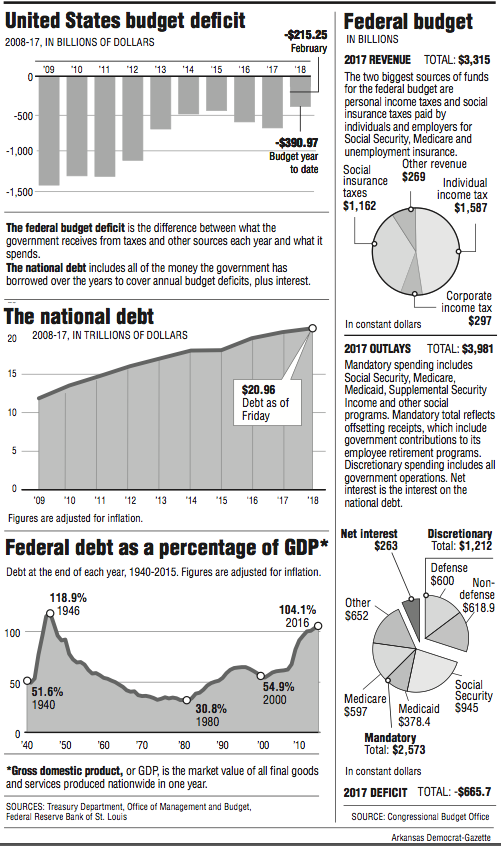WASHINGTON -- The federal government recorded a budget deficit of $215.25 billion in February, up significantly compared with the same month a year ago as the GOP tax cuts passed in December take effect.
On Monday, the Treasury Department said that the February deficit was 12.1 percent higher than a year ago, reflecting in part a drop of $5 billion in individual withholding taxes paid last month compared with a year ago.
In February, employers started using tax tables that withhold less from paychecks based on the new law.
"Increases in wages and salaries were more than offset by a decline in the share of wages withheld for taxes," the Congressional Budget Office said in an analysis released last week.
For the first five months of fiscal 2018, which began Oct. 1, the federal budget deficit totaled $390.97 billion, an increase of 11.5 percent compared to the same period a year ago.
President Donald Trump's new budget projects this year's deficit will hit $873 billion, up a sharp 31.3 percent from last year's imbalance of $665.8 billion.
Over the next decade, Trump's budget projects federal budget deficits will total $7.1 trillion. That is more than double the $3.2 trillion in deficits over the coming decade that Trump had envisioned in the budget he sent Congress last year. The deficit picture has darkened in part because of the tax cuts Trump and Republican lawmakers pushed through Congress in December totaling $1.5 trillion over the next decade.
The administration argues that the tax cuts will pay for themselves over time by boosting growth. But critics contend that this is an overly optimistic view. They argue that deficits will be much worse than Trump is currently forecasting because his budget is using overly optimistic economic forecasts and does not take into account increased government spending which was approved in a January budget deal.
The data underscore concerns by some economists that Republican tax cuts enacted this year could increase the U.S. government debt load, which has surpassed $20 trillion.
Some private forecasters believe annual deficits will top $1 trillion beginning next year and remain at that level in coming years.
The Committee for a Responsible Federal Budget, a non-partisan group that opposes deficit spending, released a report earlier this month projecting that $1 trillion deficits will return next year with the annual deficit hitting $2.4 trillion in 10 years.
For the current budget year, the Treasury report said revenues totaled $1.29 trillion, up 2.4 percent from a year ago, while outlays totaled $1.34 trillion, up 4.2 percent from the same period a year ago. Both the revenues and spending totals are records for the first five months of a federal budget year.
Information for this article was contributed by Sarah McGregor of Bloomberg News.
A Section on 03/13/2018
